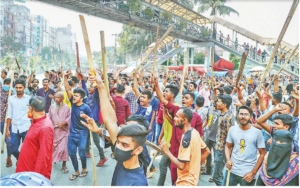THE garment sector, a cornerstone of Bangladesh’s economy, is currently at a crossroads. With escalating worker unrest in Gazipur and Dhaka and a minimum wage that falls significantly short of a living wage, the industry faces a volatile situation that demands immediate and sustainable solutions. This article explores why increasing labour wages is not just a moral obligation but a strategic necessity for sustainable development and social stability in Bangladesh.
According to research by the South Asian Network on Economic Modeling, the living wage in Bangladesh ranges from Tk 19,200 to Tk 26,000, depending on the area. This creates a 51–60 per cent gap between the workers’ actual income and their minimum needs. The current unrest among garment workers, demanding a minimum monthly wage of Tk 23,000, highlights the urgency of addressing this gap. Failure to do so could turn this wage gap into a ticking time bomb, leading to further social and economic instability.
The impact of low wages extends beyond economic metrics; it has a devastating effect on the quality of life for workers and their families. Daily challenges include malnutrition, poor health, inadequate living conditions, and a lack of education. This creates a cycle of poverty and has long-term implications for the country’s social fabric and human capital development.
While factory owners like BGMEA president Faruque Hassan argue that higher wages would hurt competitiveness, this does not represent the entire story. Low wages result in low purchasing power, affecting domestic demand and hampering the growth of other economic sectors. On the contrary, a reasonable wage increase would stimulate domestic consumption, leading to a more balanced and resilient economy. Moreover, the current unrest has resulted in factory closures, production losses, and reputational damage, which are detrimental in the long run.
The argument that higher wages would make Bangladesh less competitive globally is flawed. Labour is not the only factor that determines competitiveness. Innovation, quality and operational efficiency are equally important. Additionally, there is a growing global trend to prefer ethically produced products, which includes fair labour wages. Therefore, increasing wages could enhance Bangladesh’s worldwide reputation and marketability.
In an era where ethical consumerism is on the rise, especially among Western consumers, the issue of low labour wages in Bangladesh’s garment sector could have international repercussions. Consumers in countries like the United States and the United Kingdom increasingly scrutinise the ethical practices behind the products they purchase. Brands that fail to ensure fair labour wages and decent working conditions are often subject to boycotts, negative publicity, and a loss of customer trust. In this context, maintaining low wages not only jeopardises the well-being of workers but also risks alienating a significant portion of the global market that values ethical production. Therefore, increasing labour wages is a domestic imperative and a strategy to maintain and enhance market access in countries where consumers are becoming more socially responsible.
The recent wave of protests, strikes and even violence indicates a breakdown in social stability. This is detrimental to both workers and businesses and disrupts broader social harmony. Fair wages can foster a more stable environment, which is beneficial for long-term planning, investment and sustainable development.
Paying a living wage is not just an economic issue; it’s a moral imperative rooted in social justice. It’s about acknowledging workers’ invaluable contributions to the economy and compensating them fairly. Fair wages are about dignity, respect, and creating a society that values each of its members. If we ignore all other factors, we should do it because living in this country is costlier than it used to be because of inflation, and increasing the wage is the right thing to do.
Addressing the wage issue requires a multi-pronged approach involving all stakeholders — government, industry owners, and labour unions. Transparent and inclusive negotiations are crucial for arriving at a fair wage structure. To be implemented by December, the new wage structure must adequately address the current wage gap to prevent future unrest. Law enforcement agencies also have a role to play in de-escalating tensions and maintaining social stability.
While wages are central to the current crisis, they are symptomatic of broader systemic issues, including working conditions and workers’ rights. A comprehensive approach is necessary for long-term stability. This could include regular wage reviews, better working conditions, and stronger labour laws. Policy interventions, such as subsidised housing and health care, can also improve the overall well-being of workers.
The ongoing unrest in Bangladesh’s garment sector serves as a wake-up call for all stakeholders. It’s time for a balanced and sustainable approach that recognises the dignity and worth of every worker while ensuring the sector’s long-term viability. Failure to act could result in a lose-lose situation for everyone involved, with far-reaching implications for Bangladesh’s economy and social fabric. Developing alone is no development at all; true progress is inclusive and considers the well-being of every individual in the community.
New Age

 Quazi Tafsirul Islam
Quazi Tafsirul Islam







